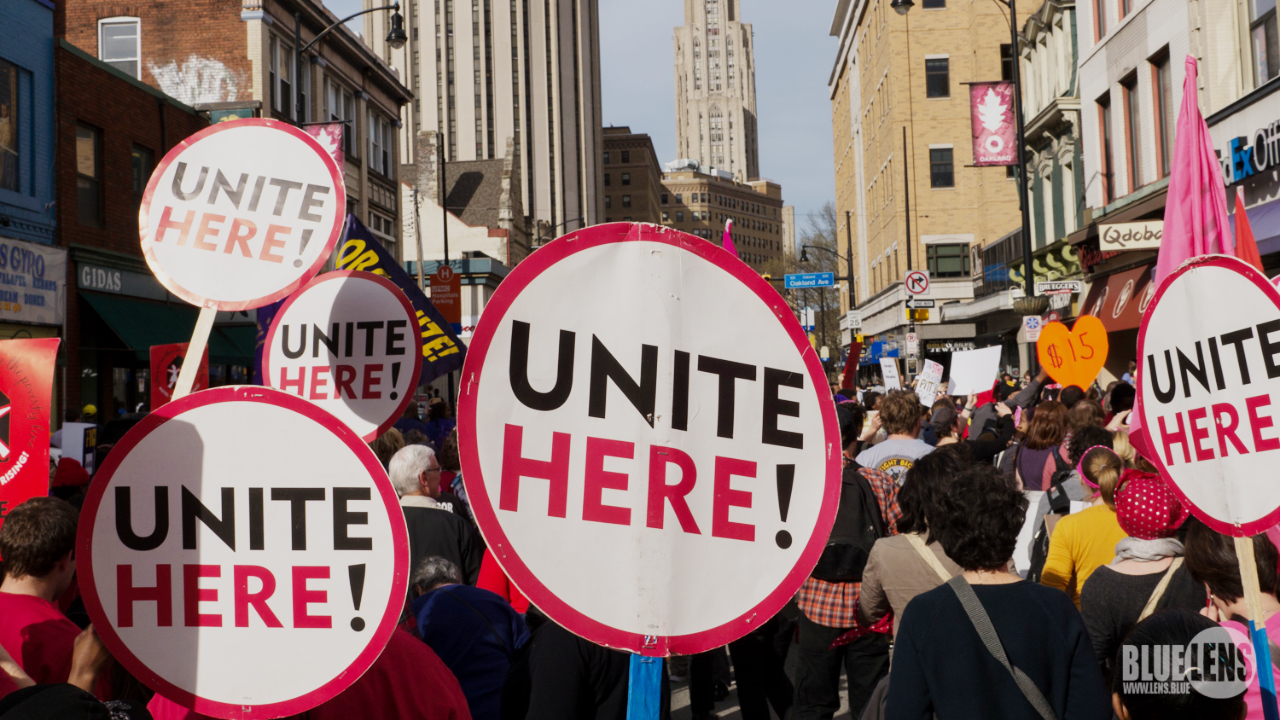This month, I celebrate my 25th anniversary of paid organizing with UNITE HERE, North America’s hospitality-sector labor union. I will spend the actual day in a meeting about how we are going to grow by 100,000 workers represented over the next 5 years.
My years as a labor organizer have been challenging, joyous, and sometimes devastating, like all organizing. We have a long way to go to organize on the scale that current conditions demand. But my work has directly and indirectly contributed to the first-time organization of well over 25,000 low-wage workers, mostly in the US South, and that is something to celebrate.
In reflecting on the past quarter century, I thought about the “Top 10” lessons that stand out most powerfully to me about how to succeed in organizing.
Lesson One
A big part of winning is believing that we are winning and acting like it at all levels – with the boss, the mayor, our staff, the committee, etc. That said, it matters to have a strategic plan to win – always.
Good tactics aren’t enough.
Your organizing team and the working people we are organizing, whether on the job or in the community, are no strangers to loss and deception. They always know if you are shining them on about whether or not you have a plan to win. Don’t fake it. Make one. And then you can add a little swagger to the mix.
Lesson Two
Even if we have a solid and inspiring plan to win, we need to really listen to the workers (or the neighborhood residents, laypeople, etc.). Our job is to tap into working people’s innate practicality, life experience, and anger. That will allow us to take our plan and turn it into a victory.
The week of 9/11/01, I was leading a group of 200 hotel workers in Providence into a fight for their 3rd contract. This was the year, we’d said, to make significant improvements, particularly for the room attendants. Soon after the attacks, the conventional wisdom was that the hotel market would tank, and that it would not be a wise time to bargain.
Our national president at the time, for whom I had enormous respect, counseled to extend the contract by one year, but allowed us the space to make our own local choice. Particularly since nobody really knew what would happen in a small market like Providence, RI after such a crisis, I asked my committee.
Unequivocally, they said we should go ahead and give bargaining our best shot. We did, and after a public fight, we made dramatic improvements to the contract.
Lesson Three
Be unfailing honest about the choices and challenges people face in organizing – and the potential consequences (eviction, loss of employment, etc.) – don’t sugar-coat or attempt to “protect” people. Anything less is patronizing, and people can smell a lack of candor it a mile away.
The story above is an example where I also followed this instince. But last year’s nationwide election to organize nearly 3,000 United Airlines catering employees provides an even more potent example.
We had organized the workers in five cities around a plan to win that was predicated on decades of history under the Railway Labor Act (RLA). Namely, that the RLA doesn’t postpone elections, but instead deals with allegations of misconduct after the vote.
That was before Trump appointees dominated the National Mediation Board. I was leading the campaign. When the election was indefinitely postponed, our leadership team made a decision. We would not every fall into the tempting trap of trying to make people feel like the vote was coming “soon.”
Instead, we told people we didn’t know if it would ever come, but we trusted that they would be willing to fight and act like a union anyway. They did. After six months of waging an unanticipated (and quickly assembled) comprehensive campaign, the workers finally got the right to vote – and chose UNITE HERE by 72%.
Lesson Four
Part of organizing and building our power is recognizing that Internalized racism and sexism can get in the way of making the best decisions, particularly about who can organize or not. I have seen organizers err in two directions – First, and most frequently, by assuming that someone is “not ready” to lead – be it by joining the committee or becoming an organizer, because their life challenges are too great, they are a single mother, etc.
My counsel is always to let the person decide for themselves. Anything short of that is paternalistic. I have also seen white leaders fail to discipline or counsel someone whose behavior is out of line or whose work is not up to par because of a fear of being seen as racist.
I have had to ask people of all backgrounds to leave campaigns due to serious error more than once. I have also had people come back later to thank me for it, because they know I acted based on principle and that they were not acting in the best interest of our organization.
When we treat people with “kid gloves” out of fear, we are actually denying them the opportunity to be their best selves, and therefore to grow their leadership.
Lesson Five
Have high expectations for your staff and committee, but also make a plan up front for clear, methodical and accessible training – simple raps (preferably visual tools with more graphics than words), simple turnout and tracking charts, and check-ins that follow a routine formula for accountability.
One of my wisest comrades in our union once described the way to run an organizing check in as a “mantra.” The concept stuck with me. When trying to win a vote, or collect a majority on cards, or do anything else on a timeline, really, it matters to keep team meetings tight and to the point.
Asking the same set of questions in every meeting helps – e.g., How many doors did you knock today, how many visits, how many new contacts, etc.?
Also, using simple, visual tools can empower members — particularly people with limited formal education or for whom English is a second language — to be effective organizers.
In the United campaign, we used a visual “Roadmap” to outline our plan to win. A comic book inoculated workers on what behavior the boss would use to try to intimidate or keep people divided. These tools were laminated and went into a binder that even brand new organizers could use effectively on visits.
Lesson Six
Honor and share your own story – the life history that makes you a “real” person (and not an organizing robot) who is able to relate to another human’s life experience(s). This kind of sincere organizing can transcend differences in class or race. We shouldn’t ignore those differences, but we shouldn’t devalue our own experiences in life, love, work, and relationships.
Everyone has struggles big and small, and showing how we have confronted and overcome them inspires other people to take those steps for themselves. When I was organizing in the California desert in 2002, I had a moment of reckoning. After eight years of organizing with great success, I had people running from me.
Partly it was because workers didn’t believe we could win. But also it was because they knew next to nothing about me, except that I wanted them to do something incredibly scary and hard.
Once I “owned” how I’d overcome some of my own challenges, particularly in my own family, and learned how to talk about them, I was able to move people more effectively to face their own fears.
Lesson Seven
During a particularly hard campaign, I was gifted a small piece of glass with the word “Courage” written on it by a fellow organizer who was helping me to organize clergy in the Coachella Valley.
Imagine knocking on a pastor’s home door two days before Christmas because he’s been running from supporting the workers. That was some of the hardest organizing I’d ever done. But having that small amulet reminded me of the importance of treasuring my victories. It allowed me to remember the moments when I had led people into scary confrontations with their employers or politicians, and also the moments where I had watched people demonstrate incredible courage in the face of fear and hostility.
That said, sometimes showing a little uncertainty or sharing a moment where we feel (or have felt weak) can also be a superpower. The people we are training and leading need to see that we don’t have ALL the answers – it gives them space to step up and fully contribute their own talent, ideas and leadership.
Lesson Eight
Never forget that having fun matters. Find reasons to laugh (often). Planned fun also matters towards building our organizations. Take your team bowling, go to karaoke or dancing, and have group meals – regularly, particularly during long hard campaigns.
It can seem counterproductive to take time away from the field, but it matters. People appreciate the chance to get to know one another socially and to blow off some steam. And it’s ok to set explicit boundaries about what’s ok or not ok in that context – e.g., “nobody with a rental car gets to have even one drink”, or “this is not a place to find romance.” People appreciate learning in a safe, fun, environment.
People also appreciate a little time off when they are working really hard. Allow your team Sunday morning off for laundry and/or church. I can’t tell you how often organizing leads or directors neglect to do this, because the work just seems too urgent, or because they are personally used to working long hours.
I’d rather push people to meet their goals faster, and let them take a break, than just insist that everyone has to work 70 hours per week.
Lesson Nine
Have a support group for yourself – or at least a few people you 100% trust to have your back. Talk to them regularly, and rely on them when things get hard – they will help you to find your course. Since about 2002, I have had a fairly regular “peer group” within my organization.
This group has included staff who are doing similar work with about the same level of responsibility for leadership and training. We talk as regularly as we can. For the past five years, I’ve been in a consistent group with 3 other senior organizing directors.
Collectively, we have organized well more than 50,000 workers and trained hundreds of staff. And yet, we each still have moments of doubt, frustration, and confusion. Our trusting relationships allow us to show weakness, but also to push each other to face challenges or take on new ones, and to support each other’s success.
One of my peer group members came to run the GOTV operation for United in Houston when my wedding ended up in the middle of our (long-delayed) five-week vote period. She literally kicked me out the door a week in advance of the ceremony so I could go rest and finish final preparations.
Lesson Ten
Finally, do one thing every day that scares you (credit to Eleanor Roosevelt for the quote). Better yet, do it before noon.

